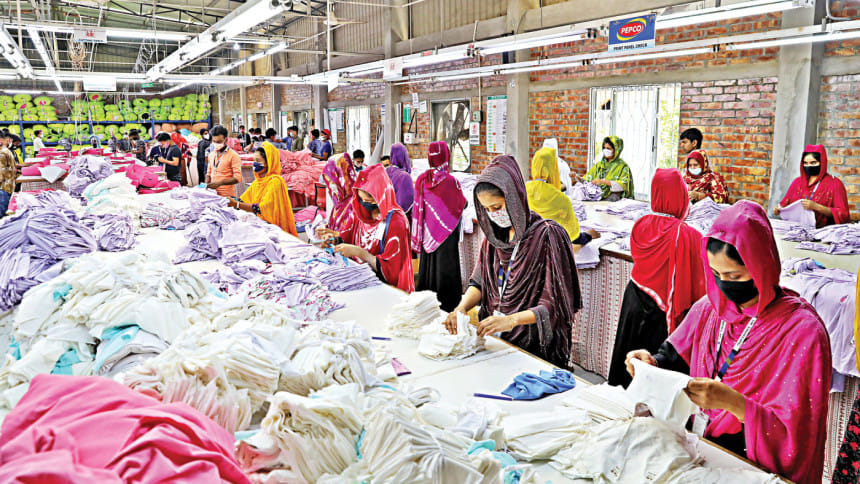GDP output may rise 40% if women’s participation in economy widens

Bangladesh can increase its economic output by nearly 40 percent by closing the gender gap and increasing women's participation in the economy, according to the International Monetary Fund (IMF).
"Sizable gaps in women's economic empowerment undermine growth and exacerbate climate vulnerability in Bangladesh," said the multilateral agency in an article last week.
Per capita incomes in Bangladesh have risen seven-fold in the past three decades while poverty has been reduced to a fraction of former levels.
"Such progress has been driven in part by greater labour force participation by women, most notably in the garment industry, and has been accompanied by other meaningful improvements in women's empowerment," said the article jointly written by Jayendu De and Genet Zinabou.
"Our recent analysis, however, shows there is still large gaps between women and men. Notably, women's labour force participation is only half the rate of men."
Jayendu De is the IMF resident representative in Bangladesh while Genet Zinabou is an economist in the fiscal affairs department.
The writeup, citing an IMF's previous research, said closing the gap could increase Bangladesh's economic output by nearly 40 percent.
"Women also remain less likely than men to obtain tertiary education, and they face greater barriers in accessing financial services. Remedying both factors could raise the entire economy's productivity."
The article said Bangladesh's extreme vulnerability to climate change and natural disasters makes the efforts to close gender gaps challenging.
"Climate shocks generally affect the already poor and vulnerable the most. This means that Bangladeshi women, who on average have fewer resources than men, are likely to be disproportionately impacted."
It highlights several factors that render women uniquely exposed to the effects of climate change and natural disasters.
Women's employment is highly concentrated in agriculture and informal work and climate change directly affects agricultural production. Informal workers are often particularly vulnerable to climate shocks as they lack access to social insurance programmes.
The article said both international and internal migration are important climate adaptation strategies. But these are availed mostly by men: men are 16 times more likely to be employed overseas than women, who tend to be primary caregivers for children and the elderly, leaving them less mobile and more likely to remain living in areas highly exposed to climate change.
Women carry the primary responsibility for collecting drinking water and cooking fuel. As warming temperatures, rising sea levels, deforestation and more frequent cyclones and droughts render these tasks more time-consuming, women's time poverty is expected to be exacerbated, the IMF warned.
Bangladesh has already recognised the need to integrate gender perspectives in its 2009 Climate Change Strategy. Following this, the government adopted the first Climate Change and Gender Action Plan 2013, which it updated in March 2024.
"Renewed efforts will be needed to ensure successful implementation of the plan and achieve simultaneous progress on climate action and gender equality," it added.
"To this end, policymakers should capitalise as much as possible on the synergies between women's empowerment, economic growth, and increased resilience to climate change."
The article said policies that support women's labour force participation deserve particular attention. These include increasing women's access to skills development and higher education, easing the pressure on women on unpaid care burdens by expanding affordable childcare and reducing informality.
De and Zinabou also suggest addressing those gender norms that discourage women from seeking formal jobs and higher pay.
"Boosting health and education spending would help empower women while raising labour productivity and making the whole population more resilient to climate change."
The article said persistent gaps between women and men in access to finance should be tackled by instilling confidence in formal finance, strengthening women's property rights, and carrying out financial literacy campaigns targeted at women.
"Women should not be considered mere beneficiaries of climate action. Rather, just as women played an integral role in the development of the garment industry and Bangladesh's growth success in recent decades, they should be empowered to play an active role in the country's green transition."

 For all latest news, follow The Daily Star's Google News channel.
For all latest news, follow The Daily Star's Google News channel. 



Comments